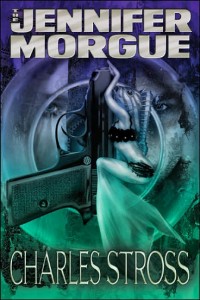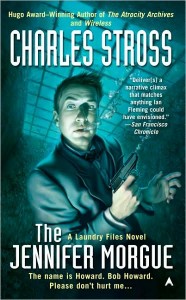
 Bob Howard works for the Laundry, a top-secret British organization formally known as the Department of Internal Logistics. His job: to help protect the world from things so unnatural, so bizarre, so nasty, even knowing about them could destroy a man’s brain. They’re the ones who deal with mad scientists, Elder Gods, other dimensions, and all that other fun stuff, utilizing weird devices and mathematics so advanced it’s akin to magic. And sometimes, Bob regrets ever asking that he be assigned to active service … in other words, out in the field.
Bob Howard works for the Laundry, a top-secret British organization formally known as the Department of Internal Logistics. His job: to help protect the world from things so unnatural, so bizarre, so nasty, even knowing about them could destroy a man’s brain. They’re the ones who deal with mad scientists, Elder Gods, other dimensions, and all that other fun stuff, utilizing weird devices and mathematics so advanced it’s akin to magic. And sometimes, Bob regrets ever asking that he be assigned to active service … in other words, out in the field.
This newest mission may just be the one to break him and send him running home. He’s been partnered with Ramona, a demon who represents the Laundry’s American counterparts, the Black Chamber, and sent on an undercover mission against an evil genius who’s acquired an ancient, evil artifact of some sort. Bob has to puzzle out the elements of his mission, untangle his destiny from that of a soul-eating succubus (or some such), and prevent war from breaking out between the surface world and the dark things which live at the bottom of the ocean. Worse, he seems to be falling under the power of a geas which could destroy him. As he gets further into the act, and closer to the center of things, events take on a very familiar sort of pattern. Can Bob save the day? Or is he going to fall victim to a dangerous madman’s diabolical plan for world domination?
The Jennifer Morgue quite deliberately, and elaborately, draws upon the resonance of the James Bond mythos, infusing it with a Lovecraftian paranoia and a metatextual brilliance. This story is … well, honestly, it defies easy description. Stross takes some old and familiar elements, and puts a new spin on them. I’ve seen plenty of Bond parodies and homages and tips of the hat over the years, but this may be the first time I’ve seen anyone turn the Bond mythos into a magical paradigm to be used offensively. It’s one thing to be an evil genius seeking world domination, and it’s a different thing to wrap yourself in those trappings as part of an even greater plot. And melding it together with the pre-Cold War bleakness and fear of the unknown and adventure found in the Lovecraftian mythos? Well, you wouldn’t think these two elements would play well together, but they seem to be a perfect mix. And the twists Stross throws in? Let’s just say I didn’t see it coming.
I’m pretty sure Stross is writing beyond my usual sphere of comprehension. I greatly enjoyed The Jennifer Morgue, but there were times when I felt left behind, just because he goes off on some really esoteric or technical angles. But looking at this on the surface, as a James Bond meets Lovecraft meets quantum physics, you end up with a fascinatingly strange, rip-roaring adventure. (And I love that the main character is named Robert Howard, which isn’t too far off from Robert E. Howard, best-known for creating Conan, and a friend/pen-pal of H.P. Lovecraft back in the day…)
“Pimpf” is an odd “extra,” a short story that first saw print online at Jim Baen’s Universe (http://www.baens-universe.com) and it’s another one of Bob Howard’s adventures. In short, it’s all about how Bob has to deal with departmental politics and bureaucratic nuisance, an unwanted intern, and a private online game server gone haywire. Things get messy, and then they get ugly, sticky, explosive, and dangerous. Possibly in that order. So who, or what, is behind the troubles at hand? Therein lies the mystery.
“Pimpf” likewise makes use of nested realities, computers that can perform math that might as well be magic, and other such strange concepts. Unfortunately, I found it hard to really get into the concept of the online game that plays such a major role in this story, so I wasn’t able to appreciate it to its full potential. Nonetheless, it’s an intriguing story, that further fleshes out the weird world of the Laundry.
Stross rounds out this volume with several essays that go into a lot more detail about his inspirations and sources. In “Afterword: The Golden Age of Spying,” he goes into detail about how James Bond is basically Ian Fleming’s “Mary Sue” (Google it, I dare you) character. Then he elaborates on the nature of arch villains like Bond’s Blofield, and the earlier, less immortalized Dr. Mabuse. Then Stross attempts to get into the mindset of people like Blofield, actually making their point of view seem entirely reasonable, and recasting people like Bond and his masters as the true villains. Socialist villains, no less. He finishes things off by relating the golden age of spying (those early decades of the Cold War) to the moods and themes of Lovecraft’s work. This collection of mini essays is fascinating, informative, and sheds quite a lot of light into the themes and plotlines of Stross’s Laundry stories.
Overall, The Jennifer Morgue is definitely a different offering from the norm. Its perfect for those who are always looking for cutting-edge fiction and boundary-stretching ideas. I thoroughly enjoyed it, even when I wasn’t entirely sure what was going on beneath the surface. Give it a shot, if you’re in the mood for something challenging.
